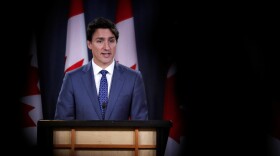Winter has arrived early in much of Canada. In eastern Ontario, schoolchildren have already had snow days, and the grass is barely visible. Politically, it also feels like this winter could be one of discontent in Canada.
The Oct. 21 election revealed just how divided the country is politically. Québec voters elected the highest number of separatist Bloc Quebecois Members of Parliament (MP) in 25 years. There are only Conservatives representing Saskatchewan and Alberta now.
The dissatisfaction in the west comes from three issues. Many in oil and gas-rich Alberta and Saskatchewan are disappointed that Prime Minister Justin Trudeau’s government in Ottawa has decided not to build more pipelines to get oil to the west coast or the United States so it can be refined and shipped to overseas customers. They are also disappointed with the slow progress on the Trans-Mountain Pipeline, the one the government did approve.
Resentment towards the federal government is also strong in Saskatchewan and Alberta because of equalization. That’s a system where provinces with strong economies and federal shares of tax revenue that match sort of subsidize provinces with weaker economic performance in order to maintain an equal level of public services across the country. Alberta particularly feels like it is footing too much of the bill for other parts of the country, particularly Quebec, which is the province that receives the most equalization support, largely because of its relatively small population and economic output that is spread over a large territory.
Quebec’s resentment towards the federal government is really just a continuation of the nationalism and concern for protection of francophone identity that has ebbed and flowed for decades.
The discontent in the west has recently taken the form of Wexit, a term borrowed from Brexit. Its supporters want Alberta, Saskatchewan, and possibly Manitoba to separate from Canada and form a new country. They have held rallies and meetings in recent weeks where their audiences numbered in the hundreds.
The strongly right-leaning conservative provincial governments in Alberta and Saskatchewan are not supporting the idea of Wexit, but they are sympathetic to more autonomy for their provinces.
In the past week, Saskatchewan Premier Scott Moe met with Prime Minister Trudeau in Ottawa and after, told reporters he doubted that Trudeau would keep his promise to govern differently that he made following the slip to a minority of seats in parliament during the election.
Meanwhile in Alberta, Premier Jason Kenney is exploring ways to increase the province’s autonomy while remaining within Canada. Only Quebec, Ontario, and part of Newfoundland are served by provincial police forces, the rest use the Royal Canadian Mounted Police (RCMP). Now, Kenney is considering establishing a provincial police force in Alberta and withdrawing the province from the Canada Pension Plan (CPP), which is like Social Security. Quebec has never been part of the CPP since its creation in 1965.
Western resentment towards the centers of politics and economy in eastern Canada is nothing new. During the first half of the 20th century, it spawned the creation of some of Canada’s more enduring and fringe political movements like the Progressive Party, the Socialist Party, Social Credit, and the Cooperative Commonwealth Federation, which is now the New Democratic Party (NDP).
During the 1970s and 1980s, western resentment was also strong towards Prime Minister Pierre Trudeau, the current prime minister’s father, and it was for similar reasons—energy policy and perceived favoritism towards Quebec. “Let the eastern bastards freeze in the dark,” was a common remark by alienated westerners. Someone even invented a board game satirizing Trudeau’s economic and energy policy. “True-dough Mania: a game of chance where you have no chance,” featured fake money and stock certificates and the objective was for players to lose all of their assets, unlike Monopoly where they accumulate them.
There is not even unity among the discontented though. In recent days, after Premier Kenney of Alberta announced he’s considering ways of making his province more autonomous, he and Yves-François Blanchet, Leader of the Bloc Quebecois, have expressed their dislike for each other, even though they have similar objectives.
The overall discontent and resentment across the country does not help the prospects of longevity of the Liberal minority government. Prime Minister Trudeau is to name his new cabinet in the week ahead, and parliament is set to sit again on December 5. When it does, it could be as fractured as the federation it is supposed to govern.





